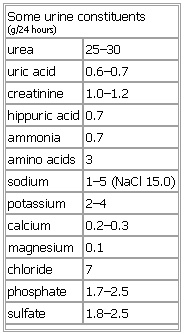Urine — U rine, n. [F. urine, L. urina; akin to urinari to plunge under water, to dive, Gr. ? urine; cf. Skr. v[=a]r water, Icel. ?r drizzling rain, AS. w[ae]r the sea.] (Physiol.) In mammals, a fluid excretion from the kidneys; in birds and reptiles, a… … The Collaborative International Dictionary of English
Urine — (from Latin Urina, ae, f.) is a typically sterile (in the absence of a disease condition)[1] liquid by product of the body that is secreted by the kidneys through a process called urination and excreted through the urethra. Cellular metabolism… … Wikipedia
Urine therapy — Biologically based alternative and complementary therapy edit Chinese food therapy Herbalism Macrobiotic diet Natural health Orthomolecular medicine NCCAM classifications … Wikipedia
Urine — Liquid waste. The urine is a clear, transparent fluid. It normally has an amber color. The average amount of urine excreted in 24 hours is from 40 to 60 ounces (about 1,200 cubic centimeters). Chemically, the urine is mainly an aqueous (watery)… … Medical dictionary
renal system — ▪ anatomy Introduction in humans (human body), organ system that includes the kidneys, where urine is produced, and the ureters, bladder, and urethra for the passage, storage, and voiding of urine. In many respects the human excretory, or… … Universalium
pregnancy — /preg neuhn see/, n., pl. pregnancies. the state, condition, or quality of being pregnant. [1520 30; PREGN(ANT) + ANCY] * * * Process of human gestation that takes place in the female s body as a fetus develops, from fertilization to birth (see… … Universalium
blood — bloodlike, adj. /blud/, n. 1. the fluid that circulates in the principal vascular system of human beings and other vertebrates, in humans consisting of plasma in which the red blood cells, white blood cells, and platelets are suspended. 2. the… … Universalium
Freshwater environmental quality parameters — are the natural and man made chemical, biological and microbiological characteristics of rivers, lakes and ground waters, the ways they are measured and the ways that they change. The values or concentrations attributed to such parameters can be… … Wikipedia
urinary tract obstruction — ▪ pathology blockage or constriction at any point in the urinary tract that impedes the normal flow of urine and causes urine to be retained in the bladder or kidneys. When an obstruction causes urine to become backed up into the kidneys,… … Universalium
malpighian tubule — ▪ anatomy in insects, any of the excretory organs that lie in the abdominal body cavity and empty into the junction between midgut and hindgut. In species having few malpighian tubules, they are long and coiled; in species with numerous (up … Universalium

